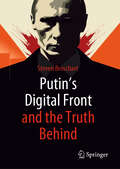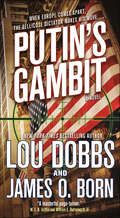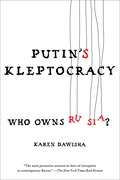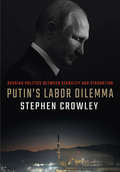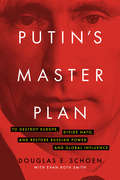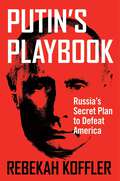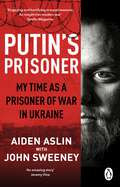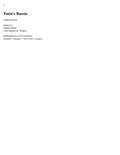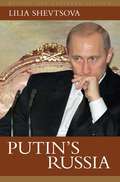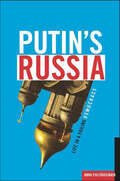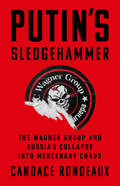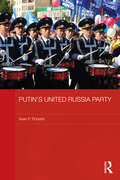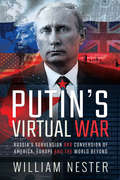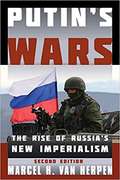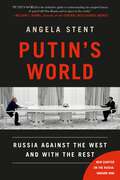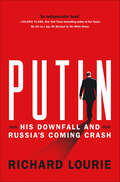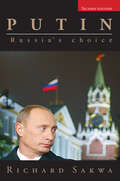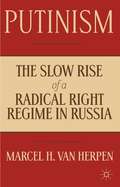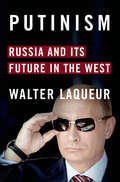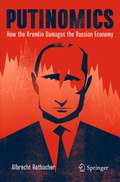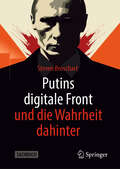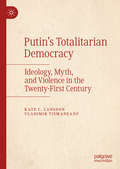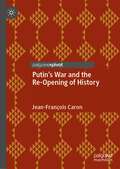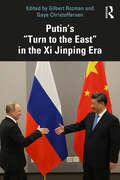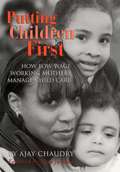- Table View
- List View
Putin's Digital Front and the Truth Behind
by Steven BroschartPutin's war in Ukraine is not only fought on the battlefield. Combat also occurs on the digital front. Words and information are the ammunition of modern, hybrid warfare—against the opposing military, but especially against civilians. It is about manipulation and control. About confusion and distraction from what is really happening. However, the internet is used not only for propaganda but also for intelligence and logistics. In doing so, Russia leaves behind a lot of traces. Analyst Steven Broschart demonstrates in clear language that requires no prior knowledge which psychological and communicative means are employed at Putin's digital frontline.
Putin's Gambit: A Novel
by Lou Dobbs James O. BornFrom TV broadcaster Lou Dobbs and award-winning author James O. Born comes Putin's Gambit, an international financial thriller about a KGB plot to use a series of terrorist attacks as cover for a Russian military incursion into Estonia.Adjusting to civilian life has not been easy for former Marine Derek Walsh. As he navigates a brutal job on Wall Street and a challenging romance, he wonders if he could be doing more with his life. When an inexplicable $200 million dollar money transfer is made on his computer, he is thrust into the world of international terror, and the global economy is knocked off its hinges. On the other side of the Atlantic, a dangerous alliance has formed. Radical Islamists and Russian extremists have set the wheels in motion for Russia to assert its power in Europe. The US President has proven to be weak on foreign policy, the military is stretched too thin, and Vladimir Putin judges this to be the time for Russia to regain its Soviet Empire. Troops mass on the Estonian border, waiting for the order to move.The FBI believes Walsh was involved in the money transfer, and a group of Russians are intent on killing him. As New Yorkers are outraged upon learning of the illegal money transfer, and the world economy crashes after a series of terrorist attacks, Walsh and his Marine buddies are the only ones that can keep the world from spinning off its axis.At the Publisher's request, this title is being sold without Digital Rights Management Software (DRM) applied.
Putin's Kleptocracy
by Karen DawishaThe raging question in the world today is who is the real Vladimir Putin and what are his intentions. Karen Dawisha's brilliant Putin's Kleptocracy provides an answer, describing how Putin got to power, the cabal he brought with him, the billions they have looted, and his plan to restore the Greater Russia.Russian scholar Dawisha describes and exposes the origins of Putin's kleptocratic regime. She presents extensive new evidence about the Putin circle's use of public positions for personal gain even before Putin became president in 2000. She documents the establishment of Bank Rossiya, now sanctioned by the US; the rise of the Ozero cooperative, founded by Putin and others who are now subject to visa bans and asset freezes; the links between Putin, Petromed, and "Putin's Palace" near Sochi; and the role of security officials from Putin's KGB days in Leningrad and Dresden, many of whom have maintained their contacts with Russian organized crime.Putin's Kleptocracy is the result of years of research into the KGB and the various thriving Russian crime syndicates. Dawisha's sources include Stasi archives; Russian insiders; investigative journalists in the US, Britain, Germany, Finland, France, and Italy; and Western officials who served in Moscow. Russian journalists wrote part of this story when the Russian media was still free. "Many of them died for this story, and their work has largely been scrubbed from the Internet, and even from Russian libraries," Dawisha says. "But some of that work remains."
Putin's Labor Dilemma: Russian Politics between Stability and Stagnation
by Stephen CrowleyIn Putin's Labor Dilemma, Stephen Crowley investigates how the fear of labor protest has inhibited substantial economic transformation in Russia. Putin boasts he has the backing of workers in the country's industrial heartland, but as economic growth slows in Russia, reviving the economy will require restructuring the country's industrial landscape. At the same time, doing so threatens to generate protest and instability from a key regime constituency. However, continuing to prop up Russia's Soviet-era workplaces, writes Crowley, could lead to declining wages and economic stagnation, threatening protest and instability.Crowley explores the dynamics of a Russian labor market that generally avoids mass unemployment, the potentially explosive role of Russia's monotowns, conflicts generated by massive downsizing in "Russia's Detroit" (Tol'yatti), and the rapid politicization of the truck drivers movement. Labor protests currently show little sign of threatening Putin's hold on power, but the manner in which they are being conducted point to substantial chronic problems that will be difficult to resolve. Putin's Labor Dilemma demonstrates that the Russian economy must either find new sources of economic growth or face stagnation. Either scenario—market reforms or economic stagnation—raises the possibility, even probability, of destabilizing social unrest.
Putin's Master Plan: To Destroy Europe, Divide NATO, and Restore Russian Power and Global Influence
by Douglas E. Schoen Evan Roth SmithVladimir Putin has a master plan to destroy Europe, divide NATO, reclaim Russian influence in the world, and most of all to marginalize the United States and the West in order to achieve regional hegemony and global power. Putin's unified strategy and vision for Europe has not been thoroughly discussed or articulated in any meaningful way until now. Putin's Master Plan is the first comprehensive attempt to systematically explain Putin's global strategy, which could inevitably and inexorably lead to the breakup of the NATO alliance, and potentially to war with the West. Currently, the West has no strategy, no plan, and no tactics to confront Putin's master plan other than imposing limited economic sanctions, which have done little to deter Putin's aggression-and may well have encouraged and facilitated it. The viewpoint taken here is not just alarmism, but an accurate and, for the first time, clear and sober portrayal of a frightening situation that, more and more, serious observers of European and Russian politics are openly recognizing and acknowledging.Putin's Master Plan makes the case that it is essential to wake up to Putin's strategy to destroy Europe, divide NATO, and build a new empire in the former Soviet Union. Russia has demonstrated an extraordinary level of aggression, most boldly in its outright invasions of Georgia and Ukraine. American weakness and a divided Europe have left Russia's terrified neighbors without an alternative to Russian domination, and even once-stalwart American allies such as the Republic of Georgia are on the brink of becoming part of Putin's new empire in Europe. Putin has made it clear that he sees NATO expansion as a fundamental threat to Russian nationhood, and he is systematically challenging the NATO Alliance as well as the United States. So far, he is winning.
Putin's Playbook: Russia's Secret Plan to Defeat America
by Rebekah Koffler"A page-turner dripping with facts and conclusions that gives us clarity few have attained; a must-read for those who want to understand [Russia and President Putin]….&” —GENERAL PHIL BREEDLOVE, USAF (Ret.), seventeenth Supreme Allied Commander Europe "Putin&’s Playbook will make readers see the urgency of developing a counterstrategy to the brilliance of Putin&’s playbook.&” —NEWT GINGRICH Russia&’s Secret Plan to Defeat America The &“Russian collusion&” hoax not only poisoned American politics but also sowed confusion about the real Russian threat to the United States. President Vladimir Putin wasn&’t colluding with the Trump campaign, but as a former U.S. intelligence specialist makes clear in this eye-opening book, the judo-loving ex–KGB agent most certainly has a plan to defeat the United States Born and raised in the Soviet Union, Rebekah Koffler came to America as a young woman. After 9/11, she joined the Defense Intelligence Agency, devoting her career to protecting her new country. Now she reveals in chilling detail Putin&’s long-range plan— his &“playbook&”—to weaken and subdue the United States, preparing for the war that he believes is inevitable. With the insight of a native, Koffler explains how Russians, formed by centuries of wartorn history, understand the world and their national destiny. The collapse of the Soviet empire, which Putin experienced as a vulnerable KGB agent in East Germany, was a catastrophic humiliation. Seeing himself as the modern &“Czar Vladimir&” of a unique Slavic nation at war with the West, he is determined to restore Russia to its place as a great power. Koffler&’s analysis is enriched by her deeply personal account of her life in the Soviet Union. Devoted to her adopted homeland but concerned about the complacency of her fellow citizens, she appreciates American freedoms as only a survivor of totalitarianism can. An opportunity to view ourselves and the world through the eyes of our adversary, Putin&’s Playbook is a rare and compelling testimony that we ignore at our peril.
Putin's Prisoner: My Time as a Prisoner of War in Ukraine
by John Sweeney Aiden AslinBrought to you by Penguin.Aiden Aslin joined the Ukrainian marines in 2018, compelled to defend his adopted homeland from the growing threat of Russian invasion. In February 2022, as Russia mounted a full-scale offensive, Aiden and his unit were stationed at the frontline at Mariupol.Pinned down at a Mariupol steelworks, after a month-long siege and running out of supplies, Aiden was part of the mass surrender of over a thousand Ukrainian troops, in April 2022. Then his real ordeal began.Singled out for his British passport, Aiden was interrogated, tortured, stabbed, turned into a propaganda zombie, tried by a kangaroo court and then sentenced to death. A victim of a catalogue of abuses of international law, Aiden struggled to cling on to any hope of survival. Certain that he was going to be executed, he was eventually freed in a prisoner exchange and permitted to return home.In Putin's Prisoner, Aiden will tell the full, harrowing story of his time fighting in Putin's war, of his six months in Russian captivity, and of his hardened resolve to defend the freedoms of the people of Ukraine.©2023 Aiden Aslin & John Sweeney (P)2023 Penguin Audio
Putin's Russia
by Stephen K. Wegren Darrell SliderThoroughly revised, expanded, and updated, the new edition of this classic text provides the most authoritative and current analysis of contemporary Russia. Leading scholars explore the domestic and international problems Russia confronts, including political, economic, societal, and foreign policy issues. The new edition provides an analysis from multiple perspectives on the major challenges facing Russia and Putin’s regime. Updates include new sections on corruption, Russia’s conflicts with Ukraine and Georgia, Russia’s response to Only by understanding these challenges—and previous efforts to deal with them—will it be possible to understand the trajectory for Russia. Well written and clearly organized, this text is an indispensable guide for anyone wanting to understand contemporary Russia.
Putin's Russia
by Lilia ShevtsovaThis revised edition includes and examination of the recent presidential and parliamentary elections and their effects on Putin's leadership and Russia.
Putin's Russia: Life in a Failing Democracy
by Anna PolitkovskayaA searing portrait of a country in disarray and of the man at its helm, from "the bravest of Russian journalists" (The New York Times)Hailed as "a lone voice crying out in a moral wilderness" (New Statesman), Anna Politkovskaya made her name with her fearless reporting on the war in Chechnya. Here, she turned her steely gaze on the multiple threats to Russian stability, among them Vladimir Putin himself.Rich with characters and poignant accounts, Putin's Russia depicts a far-reaching state of decay. Politkovskaya describes an army in which soldiers die from malnutrition, parents must pay bribes to recover their dead sons' bodies, and conscripts are even hired out as slaves. She exposes rampant corruption in business, government, and the judiciary, where everything from store permits to bus routes to court appointments is for sale. And she offers a scathing condemnation of the war in Chechnya, where kidnappings, extra-judicial killings, rape, and torture beget terrorism rather than fighting it. Finally, Politkovskaya denounces both Putin, for stifling civil liberties as he pushes the country back to a Soviet-style dictatorship, and the West, for its unqualified embrace of the Russian leader.Sounding an urgent alarm, Putin's Russia is a gripping portrayal of a country in crisis and the testament of a great and intrepid reporter, who received death threats and survived assassination attempts for her scathing criticism of the Kremlin. Tragically, on October 7, 2006, Politkovskaya was shot and found dead in an elevator in her Moscow apartment building. After several years of investigations, five men were imprisoned for her murder.
Putin's Sledgehammer: The Wagner Group and Russia's Collapse into Mercenary Chaos
by Candace RondeauxThe astonishing inside story of the Wagner Group, the world&’s deadliest militia – &“a must-read for anyone interested in the future of Russia and how to counter the Kremlin&’s wars&” (H. R. McMaster) In June 2023, the Wagner Group assembled an armed convoy that included tanks and rocket launchers and set out on what seemed like a journey to take control of Moscow. The last person to attempt such a venture was Adolf Hitler. Wagner&’s power began from patronage, then grew from international theft and extortion, until it was so great it exposed the weakness of Russia&’s conventional military and became a threat to the Russian state, one that was not demonstrably eliminated until a private jet containing Wagner&’s core commanders was blown up in midair. That Yevgeny Prigozhin, a local criminal thug, was able to build a private army that was on the threshold of overwhelming the world&’s second largest country seems incredible. In fact, it was inevitable following the hollowing out of the Russian military, the creeping use of contract groups for murky foreign missions, power struggles inside the Kremlin, and the ability of the new militias to corner and exploit the black economy. Told with unique inside sourcing and expertise, Putin&’s Sledgehammer is a gripping and terrifying account of a superpower that contracted its soul to a pitiless militia.
Putin's United Russia Party (BASEES/Routledge Series on Russian and East European Studies)
by S. P. RobertsFrom its inception in 2001, the United Russia Party has rapidly developed into a hugely successful, organisationally-complex political party and key component of power. This book provides a much needed analysis on United Russia by exploring the role of the party in the Russian political system, from 2000 to 2010. It explores the party empirically, as an impressive organisation in its own right, but also theoretically, as an independent or explanatory variable able to illumine the larger development of dominant-power politics in Russia in the same period. The book creates a model to understand the role of political parties in electorally-based political systems and shows how United Russia conforms to this model, and importantly, how the party also has unique features that affect its place in the political system. The book goes on to argue that United Russia represents a ‘virtual’ party hegemony, an outcome of political changes occurring elsewhere, and so a reversal of the typical relationship between parties and power found in comparative literature. This has potentially far reaching implications for our understanding of party dominance in the twenty-first century and also the sources of regime stability and instability.
Putin's Virtual War: Russia's Subversion and Conversion of America, Europe and the World Beyond
by William NesterA look at the Russian leader’s successful use of hard military and economic power and soft psychological power through information warfare, or “fake news.” Vladimir Putin has tightly ruled Russia since 31 December 1999, and will firmly assert power from the Kremlin for the foreseeable future. Many fear and loath him for his brutality, for ordering opponents imprisoned on trumped up charges and even murdered. Yet most Russians adore him for rebuilding the economy, state authority, and national pride.Putin has mastered the art of power. Depending on what is at stake, that involves the deft wielding of appropriate or “smart” ingredients of “hard” physical power like armored divisions, multinational corporations, and assassins, and “soft” psychological power like diplomats, honey-traps, cyber-trolls, and fake news factories to defeat threats and seize opportunities. Russian hackers penetrated the Democratic National Committee (DNC) and Hillary Clinton’s campaign organization, extracted tens of thousands of potentially embarrassing emails, and posted them on WikiLeaks.As the Kremlin’s latest ruler, Putin, like most of his predecessors, is as realistic as he is ruthless. He knows the limits of Russian hard and soft power while constantly trying to expand them. He is doing whatever he can to advance Russian national interests as he interprets them. In Putin’s mind, Russia can rise only as far as the West can fall. And on multiple fronts he is methodically advancing to those ends. Putin’s Virtual War reveals just how and why he does so, and the dire consequences for America, Europe, and the world beyond.“The author has set out the dangers that Putin has brought to the world in a must-read book.” —Firetrench
Putin's Wars: The Rise of Russia's New Imperialism
by Marcel H. Van HerpenThis fully updated book offers the first systematic analysis of Putin’s three wars, placing the Second Chechen War, the war with Georgia of 2008, and the war with Ukraine of 2014–2015 in their broader historical context. Drawing on extensive original Russian sources, Marcel H. Van Herpen analyzes in detail how Putin’s wars were prepared and conducted, and why they led to allegations of war crimes and genocide. He shows how the conflicts functioned to consolidate and legitimate Putin’s regime and explores how they were connected to a fourth, hidden, “internal war” waged by the Kremlin against the opposition. The author convincingly argues that the Kremlin—relying on the secret services, the Orthodox Church, the Kremlin youth “Nashi,” and the rehabilitated Cossacks—is preparing for an imperial revival, most recently in the form of a “Eurasian Union.” <p><p> An essential book for understanding the dynamics of Putin’s regime, this study digs deep into the Kremlin’s secret long-term strategies. Readable and clearly argued, it makes a compelling case that Putin’s regime emulates an established Russian paradigm in which empire building and despotic rule are mutually reinforcing. As the first comprehensive exploration of the historical antecedents and political continuity of the Kremlin’s contemporary policies, Van Herpen’s work will make a valuable contribution to the literature on post-Soviet Russia, and his arguments will stimulate a fascinating and vigorous debate.
Putin's World: Russia Against the West and with the Rest
by Angela StentWe all now live in a paranoid and polarized world of Putin's making, and the Russian leader, through guile and disruption, has resurrected Russia's status as a force to be reckoned with. From renowned foreign policy expert Angela Stent comes a must-read dissection of present-day Russian motives on the global stage.How did Russia manage to emerge resurgent on the world stage and play a weak hand so effectively? Is it because Putin is a brilliant strategist? Or has Russia stepped into a vacuum created by the West's distraction with its own domestic problems and US ambivalence about whether it still wants to act as a superpower? PUTIN'S WORLD examines the country's turbulent past, how it has influenced Putin, the Russians' understanding of their position on the global stage and their future ambitions -- and their conviction that the West has tried to deny them a seat at the table of great powers since the USSR collapsed.This book looks at Russia's key relationships -- its downward spiral with the United States, Europe, and NATO; its ties to China, Japan, the Middle East; and with its neighbors, particularly the fraught relationship with Ukraine. PUTIN'S WORLD will help Americans understand how and why the post-Cold War era has given way to a new, more dangerous world, one in which Russia poses a challenge to the United States in every corner of the globe -- and one in which Russia has become a toxic and divisive subject in US politics.
Putin: His Downfall and Russia's Coming Crash
by Richard LourieAn electrifying and timely book, by leading Russian expert Richard Lourie, that explores Putin's failures and whether Trump's election gives Putin extraordinarily dangerous opportunities in our mad new world."A master chronicler of modern Russia. Drawing on his own expertise, Lourie paints a convincing portrait of a ruthless authoritarian leader headed toward failure. This book serves as an essential primer on Putin and, by extension, Russia."—Publishers WeeklyFor reasons that are made clear in this book, Putin’s Russia will collapse just as Imperial Russia did in 1917 and as Soviet Russia did in 1991. The only questions are when, how violently, and with how much peril for the world. The U.S. election complicates everything, including:· Putin’s next land grab· Exploitations of the Arctic· Cyber-espionage· Putin and China…and many more crucial topics.Putin: His Downfall and Russia's Coming Crash is an essential read for everybody bewildered and dismayed by the new world order.
Putin: Russia's Choice
by Richard SakwaThe new edition of this extremely well-received political biography of Vladimir Putin builds on the strengths of the first edition to provide the most detailed and nuanced account of the man, his politics and his profound influence on Russian politics, foreign policy and society. New to this edition: analysis of Putin's second term as President more biographical information in the light of recent research detailed discussion of changes to the policy process and the élites around Putin developments in state-society relations including the conflicts with oligarchs such as Khodorkovsky review of changes affecting the party system and electoral legislation, including the development of federalism in Russia details on economic performance under Putin, including more discussion of the energy sector and pipeline politics Russia’s relationship with NATO after the ‘big bang’ enlargement, EU-Russian relations after enlargement, and Russia’s relations with other post-Soviet states the conclusion brings us up-to-date with debates over the question of democracy in Russia today and the nature of Putin’s leadership and his place in the world. Putin is essential reading for all scholars and students of Russian politics.
Putinism
by Marcel H. Van HerpenIn this original analysis of contemporary Russia, the author shows how Putin's regime is a completely new, right-wing political model that combines features of Mussolini's Italy with the 19th Century Bonapartism of Napoleon III and 21st Century Populism of Berlusconi. An essential read.
Putinism: Russia and Its Future in the West
by Walter LaqueurThere is no question that tensions between Russia and American are on the rise. The forced annexation of Crimea, the downing of Malaysia Airlines flight 17, and the Russian government's treatment of homosexuals have created diplomatic standoffs and led to a volley of economic sanctions. Much of the blame for Russia's recent hostility towards the West has fallen on steely-eyed President Vladimir Putin and Americans have begun to wonder if they are witnessing the rebirth of Cold War-style dictatorship.Not so fast, argues veteran historian Walter Laqueur.For two decades, Laqueur has been ahead of the curve, predicting events in post-Soviet Russia with uncanny accuracy. In Putinism, he deftly demonstrates how three long-standing pillars of Russian ideology: a strong belief in the Orthodox Church, a sense of Eurasian "manifest destiny" and a fear of foreign enemies, continue to exert a powerful influence on the Russian populous. In fact, today's Russians have more in common with their counterparts from 1904 than 1954 and Putin is much more a servant of his people than we might think.Topical and provocative, Putinism contains much more than historical analysis. Looking to the future, Laqueur explains how America's tendency to see Russia as a Cold War relic is dangerous and premature. As the situation in Ukraine has already demonstrated, Russia can and will challenge the West and it is in our best interest to figure out exactly who it is we are facing—and what they want—before it is too late.
Putinomics: How the Kremlin Damages the Russian Economy
by Albrecht RothacherThis book sheds new light on the political economy of Russia under Putin’s rule. The author, a former EU diplomat, presents a historical review of the Russian economy and 60 years of state-communist mismanagement, followed by oligarchic privatization. The book offers profound insights into Putin’s rule and the power mechanics of the state-dominated management of the Russian economy. It identifies and assesses the lack of rule of law, together with an arbitrary and often corrupt administration that systematically discourages entrepreneurship and the emergence of an independent middle class. Furthermore, the book discusses Russia’s budgetary policy, its dependence on the export of natural resources, state-owned enterprises and their privileges, and Russia’s external trade. This hard-hitting, substantial analysis debunks the myth of Russia’s economic might and is a must read for anyone seeking to understand the economic realities of the Eurasian continent, or considering doing business with Russia.
Putins digitale Front und die Wahrheit dahinter
by Steven BroschartPutins Krieg in der Ukraine wird nicht nur auf dem Schlachtfeld ausgetragen. Gekämpft wird auch an der digitalen Front. Worte und Informationen sind die Munition der modernen, der hybriden Kriegsführung - gegen das gegnerische Militär, aber insbesondere gegen Zivilisten. Es geht um Manipulation und Kontrolle. Um Verwirrung und Ablenkung von dem, was wirklich geschieht. Doch das Internet wird nicht nur zur Propaganda, sondern auch für die Aufklärung und die Logistik genutzt. Und dabei hinterlässt Russland eine Menge Spuren. Analyst Steven Broschart zeigt konkret, welche psychologischen und kommunikativen Mittel an Putins digitaler Frontlinie zum Einsatz kommen.
Putin’s Totalitarian Democracy: Ideology, Myth, and Violence in the Twenty-First Century
by Vladimir Tismaneanu Kate C. LangdonThis book studies the cultural, societal, and ideological factors absent from popular discourse on Vladimir Putin’s Russia, contesting the misleading mainstream assumption that Putin is the all-powerful sovereign of Russia. In carefully examining the ideological underpinnings of Putinism—its tsarist and Soviet elements, its intellectual origins, its culturally reproductive nature, and its imperialist foreign policy—the authors reveal that an indoctrinating ideology and a willing population are simultaneously the most crucial yet overlooked keys to analyzing Putin’s totalitarian democracy. Because Putinism is part of a global wave of extreme political movements, the book also reaffirms the need to understand—but not accept—how and why nation-states and masses turn to nationalism, authoritarianism, or totalitarianism in modern times.
Putin’s War and the Re-Opening of History
by Jean-François CaronThis book explores the emerging politics of Eurasia from the vantage point of Kazakhstan. Vladimir Putin’s decision to invade Ukraine in February 2022 has led to the end of the post-Cold War paradigm of liberal convergence and has triggered a geopolitical shift that will lead to the establishment of a renewed bipolar world order. However, if Russia is responsible for that shift, it will most likely not be the power that will be the leading force of the anti-Western bloc. The leading force of this emerging bloc will rather be China to which Russia is inevitably destined to be relegated as a junior partner in Beijing’s geopolitical orbit. This book, analyzing the geopolitics of a changing region, will interest scholars of international relations, Eurasia, and the economics of energy.
Putin’s “Turn to the East” in the Xi Jinping Era
by Gilbert Rozman Gaye ChristoffersenRozman, Christoffersen, and a team of expert contributors analyze the evolution of Vladimir Putin’s reorientation to Asia since 2012. When Putin announced a “Turn to the East” in Russian foreign policy upon his return to the presidency, this was to be strategic reorientation emphasizing multilateralism. As the years have passed, however, this has turned into a tight reliance on the bilateral relationship with China. Rozman, Christoffersen, and their team explore how the “Turn” proceeded and developed over the course of a decade, ending by examining the impact of the Ukraine war on Sino-Russian relations. Their analysis focuses on Russia’s perspective, taking into account an extensive range of Russian publications to look at how priorities shifted. While affirming the continued strengthening of ties between Beijing and Moscow, they identify many tensions between them, noting especially Russia’s illusions about the relationship. A comprehensive review of Russian policy toward the Indo-Pacific, which is essential reading for courses on Russian foreign policy and international relations in East Asia.
Putting Children First: How Low-Wage Working Mothers Manage Child Care
by Ajay ChaudryIn the five years following the passage of federal welfare reform law, the labor force participation of low-income, single mothers with young children climbed by more than 25 percent. With significantly more hours spent outside the home, single working mothers face a serious childcare crunch—how can they provide quality care for their children? In Putting Children First, Ajay Chaudry follows 42 low-income families in New York City over three years to illuminate the plight of these mothers and the ways in which they respond to the difficult challenge of providing for their children's material and developmental needs with limited resources. Using the words of the women themselves, Chaudry tells a startling story. Scarce subsidies, complicated bureaucracies, inflexible work schedules, and limited choices force families to piece together care arrangements that are often unstable, unreliable, inconvenient, and of limited quality. Because their wages are so low, these women are forced to rely on inexpensive caregivers who are often under-qualified to serve the developmental needs of their children. Even when these mothers find good, affordable care, it rarely lasts long because their volatile employment situations throw their needs into constant flux. The average woman in Chaudry's sample had to find five different primary caregivers in her child's first four years, while over a quarter of them needed seven or more in that time. This book lets single, low-income mothers describe the childcare arrangements they desire and the ways that options available to them fail to meet even their most basic needs. As Chaudry tracks these women through erratic childcare spells, he reveals the strategies they employ, the tremendous costs they incur and the anxiety they face when trying to ensure that their children are given proper care. Honest, powerful, and alarming, Putting Children First gives a fresh perspective on work and family for the disadvantaged. It infuses a human voice into the ongoing debate about the effectiveness of welfare reform, showing the flaws of a social policy based solely on personal responsibility without concurrent societal responsibility, and suggesting a better path for the future.
